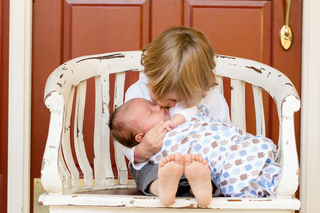Expanding your family is a beautiful and transformative journey. As you look forward to your new baby’s arrival, you may also wonder how to best support your firstborn through this significant change.
It's natural for the older child to feel a mix of positive and negative emotions when a new sibling arrives. However, with gentle preparation, you can help your firstborn thrive in their new role as a big sibling.
Understanding Your Firstborn’s Feelings
The arrival of a new sibling is a significant life change. Whether they are at toddler age or older, the range of emotions your firstborn experiences is part of the adjustment process.
- Excitement: Anticipation and joy about becoming a big brother or sister.
- Curiosity: A desire to see and interact with the new baby.
- Jealousy: Feelings of envy or resentment over the attention the new baby receives.
- Insecurity: Fear of being replaced or losing your love and attention.
To help your child manage these feelings and thrive amidst the changes, it’s essential to have open conversations and validate their emotions.
How to Introduce an Older Child or Toddler to a New Baby: 5 Gentle Tips
1. Involve Them in the Baby Preparations
One way to help your firstborn adjust to their new sibling’s arrival is to involve them in the preparations. Here are some ways to let them participate:
- Let them help in choosing baby clothes.
- Invite them to help in decorating the nursery, such as arranging toys or choosing wall colours.
- Allow them to add a small item from your hospital bag checklist, such as a toy or blanket for the baby, when you’re packing.
This involvement helps foster a sense of ownership and inclusion, reducing feelings of being left out.
2. Maintain Familiar Routines
Consistency is vital during times of change as it provides a sense of predictability and security for your firstborn.
As such, aim to maintain familiar routines, such as bedtime, playtime, and mealtimes. In doing so, you reassure them that their world isn't being completely turned upside down by their new sibling’s arrival.
3. Create Special One-on-One Moments
Give your firstborn individual attention to reinforce their unique place in the family. By continuing to attend to them as you would have previously, you reassure them that they are loved for who they are, beyond their new role as a big sibling.
This effort can also go a long way in preventing sibling jealousy towards the new baby. Here’s how you can facilitate special one-to-one moments with your older child:
- Read together: Snuggle up and read their favourite book, dedicating your full attention to them.
- Outdoor play: Go for a walk or play at the park to let them burn off energy and enjoy your undivided focus.
- Special ‘big sibling date’: Plan a simple, fun outing just for the two of you to make them feel special.
4. Introduce the Baby Gradually
Before the baby arrives, you can gradually introduce the idea of a new sibling, such as by reading storybooks about siblings and visiting friends with newborns. These efforts help to familiarise your child with the concept and prepare them for the new arrival.
When the baby is born, try to facilitate a positive connection between your children from the start by encouraging gentle interactions. For example, get them to sing to the baby or hand you a nappy wipe as you tend to the newborn, giving them a safe and meaningful way to participate in baby care.
5. Celebrate the Role of ‘Big Sibling’
You can also celebrate your firstborn’s new role as ‘big sibling’ to help them feel a sense of pride and importance in the new family dynamic.
For instance, give them a special gift to mark their new sibling’s arrival and celebrate them becoming an older brother or sister. In doing so, you reinforce their identity as an important and loved part of the family.
When to Seek Extra Support
While many children adjust well to the addition of a new sibling, some may struggle more with the transition. Look out for these signs that may indicate your child is having a harder time coping:
- Regression in behaviour: Reverting to earlier habits, such as thumb-sucking, bedwetting, or demanding a bottle.
- Persistent withdrawal: Showing a lack of interest in their usual activities or becoming quiet and withdrawn from the family.
- Increased aggression: Uncharacteristic outbursts of anger, defiance, or physical aggression directed towards you or the new baby.
If you observe these signs, it's a good idea to reach out to a paediatrician or child counsellor for guidance.
From One to Two: Embracing Your Growing Family with Flegen

With consistent support and gentle communication, you can ensure a successful transition for your children as you prepare for your newborn’s arrival.
At the same time, external support can offer a valuable advantage when overcoming some challenges and difficulties. For example, Flegen’s workshops and resources, such as our infant care classes, are designed to help you nurture a lifelong bond with your child and navigate the new family dynamics.
By offering practical guidance on newborn care and family bonding, we empower you to successfully balance your attention between your older child and your infant, fostering harmonious family relationships.
Curious to know more about how we can support you? Contact us today!


